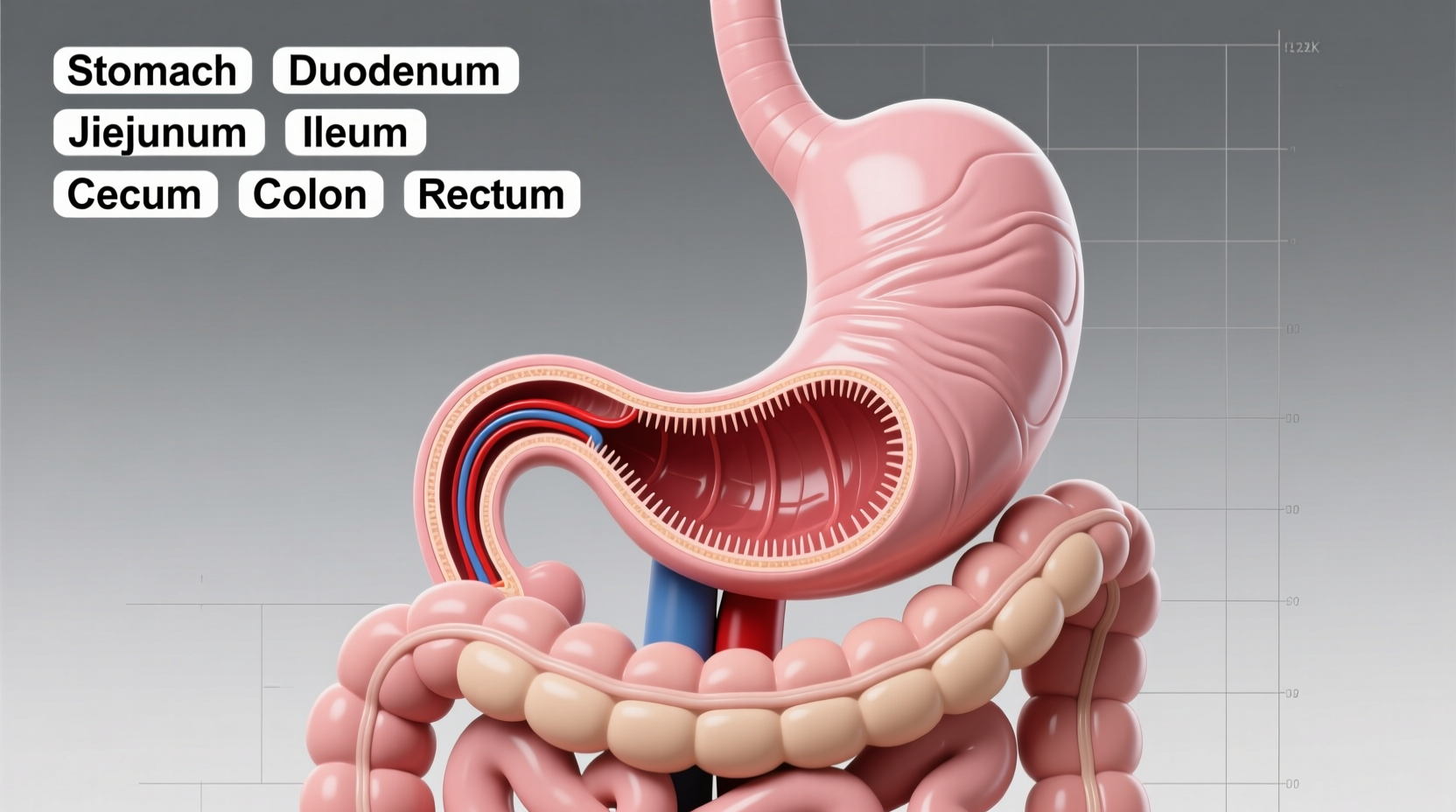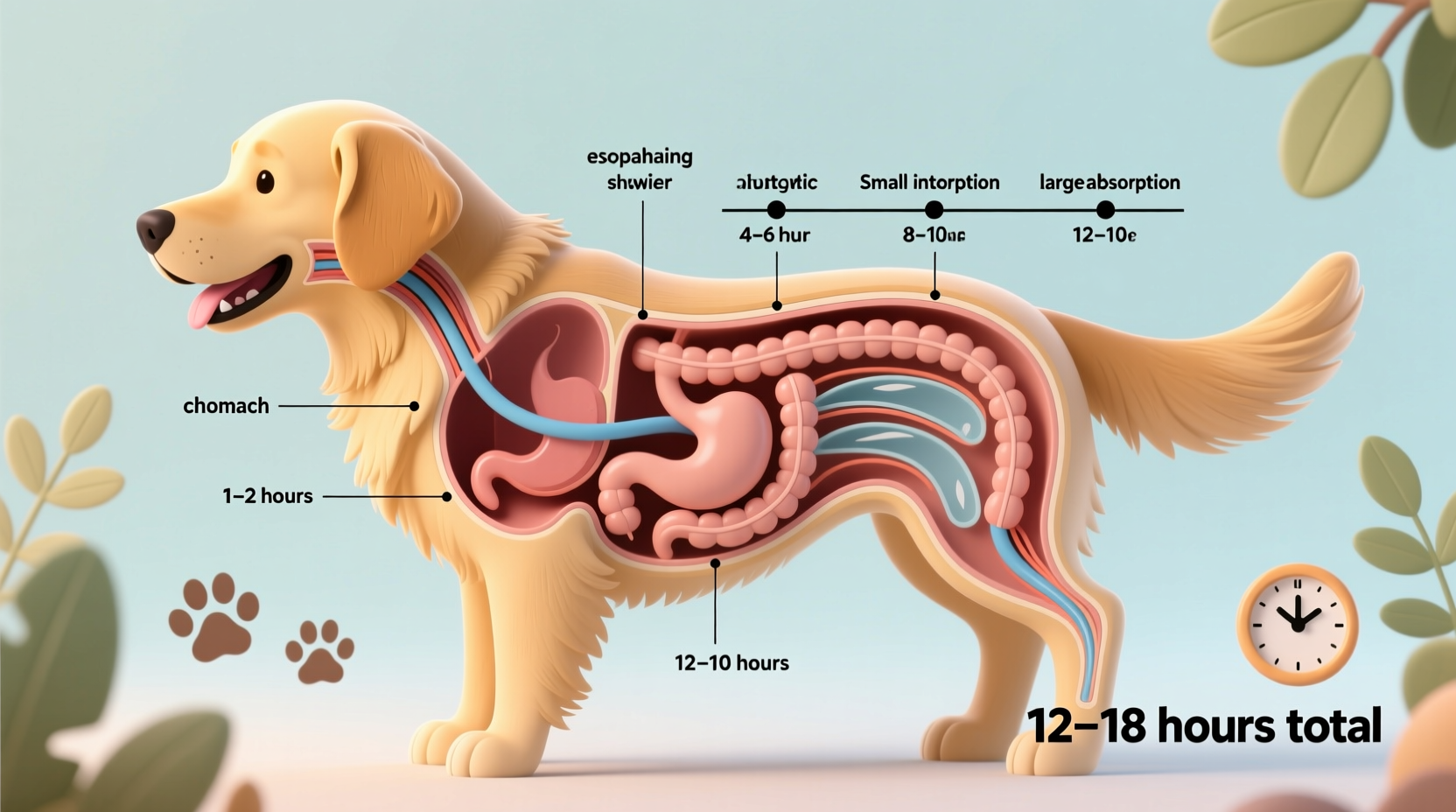As a dog owner, knowing how long digestion takes isn't just curiosity—it's crucial for recognizing when something's wrong. Whether you're concerned about your puppy's rapid digestion or your senior dog's slower processing, this guide delivers vet-verified insights you can trust.
The Canine Digestion Timeline: What Happens Hour by Hour
Dog digestion follows a predictable pattern, but the speed varies considerably between individual dogs. Unlike humans who take 24-72 hours for complete digestion, dogs process food much faster due to their evolutionary adaptation as carnivores.
| Digestive Stage | Timeframe | What's Happening |
|---|---|---|
| Mouth to Stomach | 0-2 hours | Minimal chewing, rapid swallowing, initial enzyme breakdown |
| Stomach Processing | 2-6 hours | Acid and enzymes break down proteins; food becomes chyme |
| Small Intestine | 6-8 hours | Nutrient absorption; bile and pancreatic enzymes process fats/carbs |
| Large Intestine | 8-10+ hours | Water absorption; waste formation; elimination |
This timeline comes from research conducted by the American Veterinary Medical Association, which studied digestive patterns across multiple breeds. The variation explains why some dogs need to eliminate shortly after eating while others might wait half a day.
Why Digestion Times Vary: 4 Key Factors
Your dog's digestion speed isn't random—it responds to specific biological and environmental factors. Recognizing these helps interpret what's normal for your pet.
1. Breed Size Dramatically Changes Timing
Small breeds process food significantly faster than large breeds due to metabolic differences. According to Cornell University's College of Veterinary Medicine research:
- Toy/small breeds (under 20 lbs): 6-8 hour digestion cycle
- Medium breeds (20-50 lbs): 8-10 hour digestion cycle
- Large/giant breeds (50+ lbs): 10-12+ hour digestion cycle
This size-based variation explains why your Chihuahua might need an immediate walk after dinner while your Great Dane can wait hours.
2. Diet Composition Matters More Than You Think
The type of food directly impacts digestion speed. Research from the American Kennel Club Canine Health Foundation shows:
- Raw diets: 6-8 hours (easier to break down)
- High-quality kibble: 8-10 hours (balanced fiber content)
- Low-quality kibble: 10-14 hours (harder to process fillers)
- Wet food: 6-9 hours (higher moisture content)
Dogs fed consistent diets develop predictable digestion patterns, while frequent food changes disrupt this rhythm.

3. Age Changes Everything
Puppies digest food much faster than adult dogs—their systems process nutrients rapidly to support growth. Senior dogs often experience slower digestion due to reduced enzyme production. This age progression follows a clear pattern:
- Puppies (2-6 months): 4-6 hour digestion cycle
- Adult dogs (1-7 years): 8-10 hour digestion cycle
- Senior dogs (7+ years): 10-14+ hour digestion cycle
This explains why puppies need more frequent meals while seniors often do better with fewer, larger meals.
4. Health Conditions Alter Normal Patterns
Certain medical issues significantly impact digestion time. Watch for these red flags that indicate abnormal processing:
- Too fast (under 6 hours): Possible inflammatory bowel disease, infections, or food intolerance
- Too slow (over 14 hours): Potential obstructions, hypothyroidism, or pancreatic insufficiency
- Inconsistent timing: Often indicates dietary indiscretion or stress-related issues
When to Contact Your Veterinarian: Critical Warning Signs
While variation is normal, certain symptoms indicate serious problems. Contact your vet immediately if your dog shows:
- Complete lack of bowel movements for 48+ hours (with normal eating)
- Diarrhea lasting more than 24 hours
- Vomiting undigested food 12+ hours after eating
- Visible discomfort during digestion process
- Sudden changes in normal elimination patterns
According to veterinary professionals at UC Davis School of Veterinary Medicine, "Consistency matters more than absolute timing. A dog that always eliminates 12 hours after eating isn't concerning, but one whose pattern suddenly changes needs evaluation."
Optimizing Your Dog's Digestion: Practical Tips
You can support healthy digestion through these evidence-based strategies:
Establish Predictable Feeding Schedules
Dogs thrive on routine. Feed at the same times daily to regulate their digestive clock. Most adult dogs do best with two meals 12 hours apart, allowing complete digestion between meals.
Choose High-Quality Food with Appropriate Fiber
Look for foods containing 2-4% crude fiber—enough to regulate digestion without causing gas. Soluble fibers like pumpkin or psyllium help normalize both fast and slow digestion.
Time Exercise Appropriately
Avoid vigorous activity within 2 hours of eating to prevent bloat, especially in deep-chested breeds. Gentle walks 30 minutes after eating can actually support digestion.
Monitor Water Access
Ensure constant fresh water availability. Dehydration slows digestion significantly, while sudden large water intake after meals can cause discomfort.
Common Misconceptions About Dog Digestion
Many dog owners operate under false assumptions that create unnecessary worry:
- Myth: Dogs should eliminate immediately after every meal
Fact: Most dogs eliminate 8-10 hours after eating, not directly after meals - Myth: Frequent small meals improve digestion
Fact: Most dogs digest better with fewer, larger meals that allow complete digestive cycles - Myth: All dogs should have the same digestion timeline
Fact: Normal variation spans 6-14 hours depending on individual factors
Understanding these realities prevents unnecessary concern about normal digestive variations.
Tracking Your Dog's Digestive Health
Create a simple log for 1-2 weeks to establish your dog's personal baseline:
- Note exact feeding times and food amounts
- Record elimination times (don't assume it happens during walks)
- Observe stool consistency using the Bristol Stool Chart for dogs
- Note any unusual behaviors around digestion times
This personalized data provides valuable context for your veterinarian if concerns arise, rather than comparing to generic timelines.











 浙公网安备
33010002000092号
浙公网安备
33010002000092号 浙B2-20120091-4
浙B2-20120091-4